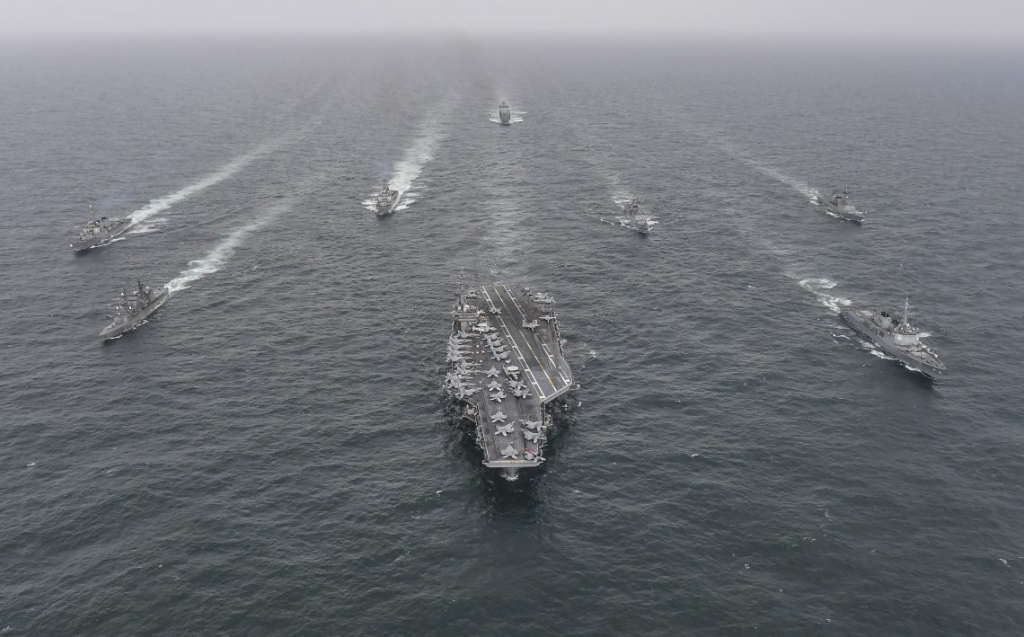In a nutshell
- The group is to cooperate broadly but is unlikely to become a formal alliance like NATO
- All member countries benefit from coordinating security, diplomatic and economic relationships
- India’s role in the Quad could be complicated by New Delhi’s ties to Moscow
The Quadrilateral Security Dialogue, comprising Australia, Japan, India and the United States, has grown increasingly prominent in recent years. And while no one should expect the group, frequently referred to as the Quad, to evolve into a formal treaty alliance like NATO, it is set to become the preeminent cooperative security framework in the Indo-Pacific. In that role it will aim to promote peace and stability, bolster freedom of the commons (air, sea, space and cyberspace) and deter China.
U.S. commitment to the Quad will remain unquestioned moving forward, regardless of the outcome of the 2024 national elections in November. Both current President Joe Biden and former President Donald Trump, frontrunners in this year’s vote for America’s highest office, have vocally advocated for the framework.
The Quad’s slow start
The four nations, all of which prize their democratic institutions and adherence to the rule of law, initially came together to provide humanitarian support following the 2004 Indian Ocean tsunami. After that, discussions continued and the first senior official meeting of the Quadrilateral Security Dialogue occurred in 2007 on the sidelines of the annual Association of Southeast Asian Nations (ASEAN) meeting. But within twelve months, the initiative was moribund.
In subsequent years, several Track II initiatives (through unofficial contacts) continued to advocate for the concept, promoting it as a diplomatic means to address a range of the four countries’ common issues, from climate or global healthcare concerns to cyber and maritime security. The initiatives also facilitated joint coordination between the countries in an effort to mitigate the destabilizing influence of China in the Indo-Pacific.
Think tanks, including the Australian Strategic Policy Institute (ASPI), the Vivekananda International Foundation, the Heritage Foundation and several Japanese research institutions have met annually to advance the Quad as a forum to expand security cooperation among the four countries and like-minded states in the region.
In 2016, prior to his inauguration, President-elect Trump revived the Quad concept. Additionally, key Asia experts joining his U.S. National Security Council (NSC) were advocates for the Quad.
Late Japanese Prime Minister Shinzo Abe (who served in 2006-2007 and 2012-2020) articulated the concept of a “Free and Open Indo-Pacific,” suggesting a framework in which nations could cooperate in promoting freedom of the commons without making it explicit that the purpose of this cooperation is to create an instrument to counter China.
In 2017, at Abe’s urging, the Quad resumed formal meetings, culminating in a conference of senior officials of the four nations. In March 2021, U.S. President Joe Biden and the prime ministers of the three other nations held their first-ever Leaders’ Meeting, virtually, followed by their first in-person meeting at the White House in September 2021. Various Quad meetings continue to take place and have expanded to include national agencies with diverse working groups and initiatives.
Coming of age
In 2024, at the Raisina Dialogue in New Delhi, the Observer Research Foundation, ASPI, the East-West Institute and the Japan Institute for International Affairs, among others, participated in the first Quad Think Tank Conference.
The presence of senior officials from all four countries and their explicit endorsements of an expansion of the Quad framework bode well for its future. For example, Indian External Affairs Minister Dr. Subrahmanyam Jaishankar asserted, “[T]he Quad is here to stay. The Quad is here to grow. The Quad is here to contribute.” Officials from Australia, Japan and the U.S. echoed him with similar remarks.

Grappling with geopolitics
Several key developments have led to the acceptance of the Quad, all of which are geopolitical factors that are unlikely to change in the foreseeable future.
Japan’s foreign policy has become more explicitly anti-Chinese, with emphasis on the physical security of its territorial space and the defense of the commons linking Northeast Asia to the rest of the Indo-Pacific.
Current Japanese Prime Minister Fumio Kishida advocates for the Quad, while Tokyo also seeks improved trilateral cooperation with the U.S. and South Korea and to more unambiguously address security cooperation with Taiwan.
Canberra now views China as a strategic rival and seeks security through partnerships – both formal and informal – with other powers, rather than having to balance relationships with China. Australia’s support of the Quad may have also helped it garner American favors, including Washington’s decision to share very closely guarded U.S. nuclear submarine technology.
For India, the Quad is an instrument for anchoring its bilateral relationship with the U.S. and countering expansionary Chinese activity in the Indo-Pacific. Both are fundamental to India’s diplomatic, security and economic strategies.
From a security perspective, New Delhi’s relationship with Washington delivers effective balance against China at both the strategic (nuclear deterrence) and conventional levels. Beijing, even with its additional investments in strategic and conventional forces, cannot fight a two-front war.
On the diplomatic field, a U.S. partnership adds weight to India’s geopolitical heft. As India strives to grow its economy, it needs the U.S. military presence to ease its defense spending burden. Also, being a strategic partner of the U.S. helps India attain better access to the lucrative U.S. market and thereby build its citizens’ affluence.
Beyond the evident value the Quad delivers to India on issues relating to economics and countering Chinese threats, New Delhi’s ties with Moscow bring some ambiguity to the grouping in a broader context. However, India’s access to the Russian military-industrial establishment may provide the Quad with unique





